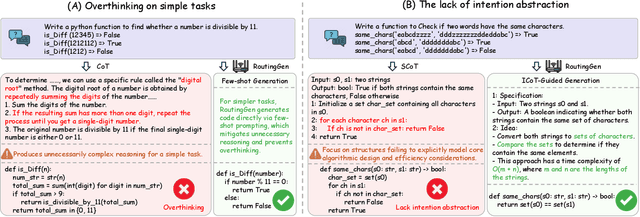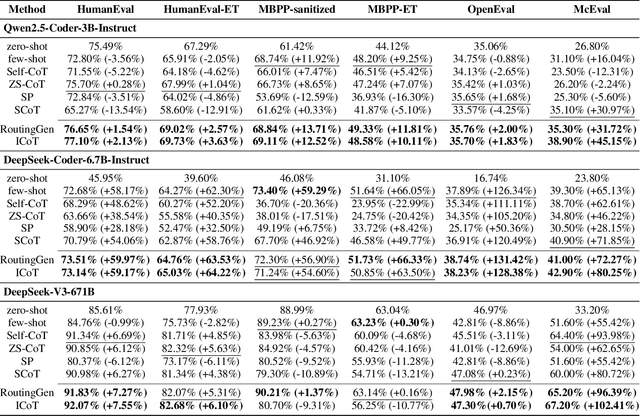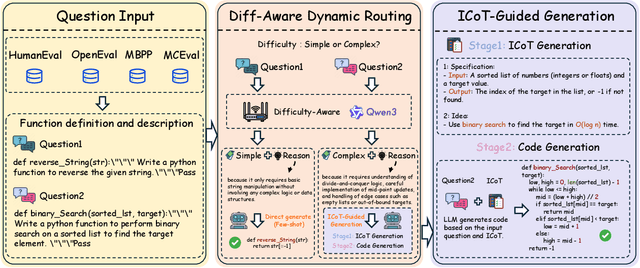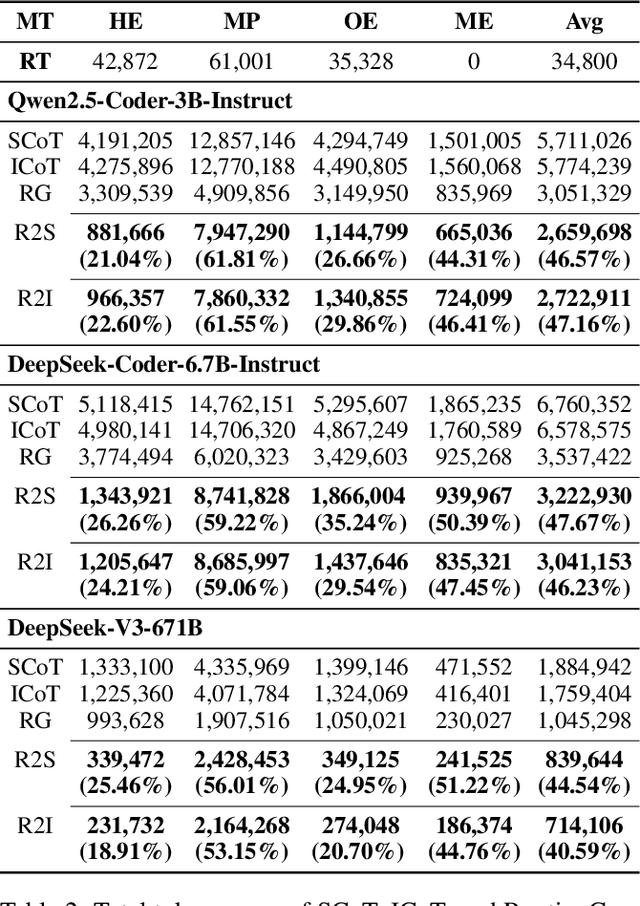Shaoxiong Zhan
Victor
Intention Chain-of-Thought Prompting with Dynamic Routing for Code Generation
Dec 16, 2025



Abstract:Large language models (LLMs) exhibit strong generative capabilities and have shown great potential in code generation. Existing chain-of-thought (CoT) prompting methods enhance model reasoning by eliciting intermediate steps, but suffer from two major limitations: First, their uniform application tends to induce overthinking on simple tasks. Second, they lack intention abstraction in code generation, such as explicitly modeling core algorithmic design and efficiency, leading models to focus on surface-level structures while neglecting the global problem objective. Inspired by the cognitive economy principle of engaging structured reasoning only when necessary to conserve cognitive resources, we propose RoutingGen, a novel difficulty-aware routing framework that dynamically adapts prompting strategies for code generation. For simple tasks, it adopts few-shot prompting; for more complex ones, it invokes a structured reasoning strategy, termed Intention Chain-of-Thought (ICoT), which we introduce to guide the model in capturing task intention, such as the core algorithmic logic and its time complexity. Experiments across three models and six standard code generation benchmarks show that RoutingGen achieves state-of-the-art performance in most settings, while reducing total token usage by 46.37% on average across settings. Furthermore, ICoT outperforms six existing prompting baselines on challenging benchmarks.
LexSemBridge: Fine-Grained Dense Representation Enhancement through Token-Aware Embedding Augmentation
Aug 25, 2025Abstract:As queries in retrieval-augmented generation (RAG) pipelines powered by large language models (LLMs) become increasingly complex and diverse, dense retrieval models have demonstrated strong performance in semantic matching. Nevertheless, they often struggle with fine-grained retrieval tasks, where precise keyword alignment and span-level localization are required, even in cases with high lexical overlap that would intuitively suggest easier retrieval. To systematically evaluate this limitation, we introduce two targeted tasks, keyword retrieval and part-of-passage retrieval, designed to simulate practical fine-grained scenarios. Motivated by these observations, we propose LexSemBridge, a unified framework that enhances dense query representations through fine-grained, input-aware vector modulation. LexSemBridge constructs latent enhancement vectors from input tokens using three paradigms: Statistical (SLR), Learned (LLR), and Contextual (CLR), and integrates them with dense embeddings via element-wise interaction. Theoretically, we show that this modulation preserves the semantic direction while selectively amplifying discriminative dimensions. LexSemBridge operates as a plug-in without modifying the backbone encoder and naturally extends to both text and vision modalities. Extensive experiments across semantic and fine-grained retrieval tasks validate the effectiveness and generality of our approach. All code and models are publicly available at https://github.com/Jasaxion/LexSemBridge/
MathSmith: Towards Extremely Hard Mathematical Reasoning by Forging Synthetic Problems with a Reinforced Policy
Aug 07, 2025Abstract:Large language models have achieved substantial progress in mathematical reasoning, yet their advancement is limited by the scarcity of high-quality, high-difficulty training data. Existing synthesis methods largely rely on transforming human-written templates, limiting both diversity and scalability. We propose MathSmith, a novel framework for synthesizing challenging mathematical problems to enhance LLM reasoning. Rather than modifying existing problems, MathSmith constructs new ones from scratch by randomly sampling concept-explanation pairs from PlanetMath, ensuring data independence and avoiding contamination. To increase difficulty, we design nine predefined strategies as soft constraints during rationales. We further adopts reinforcement learning to jointly optimize structural validity, reasoning complexity, and answer consistency. The length of the reasoning trace generated under autoregressive prompting is used to reflect cognitive complexity, encouraging the creation of more demanding problems aligned with long-chain-of-thought reasoning. Experiments across five benchmarks, categorized as easy & medium (GSM8K, MATH-500) and hard (AIME2024, AIME2025, OlympiadBench), show that MathSmith consistently outperforms existing baselines under both short and long CoT settings. Additionally, a weakness-focused variant generation module enables targeted improvement on specific concepts. Overall, MathSmith exhibits strong scalability, generalization, and transferability, highlighting the promise of high-difficulty synthetic data in advancing LLM reasoning capabilities.
A Hierarchical Framework for Measuring Scientific Paper Innovation via Large Language Models
Apr 20, 2025Abstract:Measuring scientific paper innovation is both important and challenging. Existing content-based methods often overlook the full-paper context, fail to capture the full scope of innovation, and lack generalization. We propose HSPIM, a hierarchical and training-free framework based on large language models (LLMs). It introduces a Paper-to-Sections-to-QAs decomposition to assess innovation. We segment the text by section titles and use zero-shot LLM prompting to implement section classification, question-answering (QA) augmentation, and weighted novelty scoring. The generated QA pair focuses on section-level innovation and serves as additional context to improve the LLM scoring. For each chunk, the LLM outputs a novelty score and a confidence score. We use confidence scores as weights to aggregate novelty scores into a paper-level innovation score. To further improve performance, we propose a two-layer question structure consisting of common and section-specific questions, and apply a genetic algorithm to optimize the question-prompt combinations. Comprehensive experiments on scientific conference paper datasets show that HSPIM outperforms baseline methods in effectiveness, generalization, and interpretability.
IRSC: A Zero-shot Evaluation Benchmark for Information Retrieval through Semantic Comprehension in Retrieval-Augmented Generation Scenarios
Sep 26, 2024



Abstract:In Retrieval-Augmented Generation (RAG) tasks using Large Language Models (LLMs), the quality of retrieved information is critical to the final output. This paper introduces the IRSC benchmark for evaluating the performance of embedding models in multilingual RAG tasks. The benchmark encompasses five retrieval tasks: query retrieval, title retrieval, part-of-paragraph retrieval, keyword retrieval, and summary retrieval. Our research addresses the current lack of comprehensive testing and effective comparison methods for embedding models in RAG scenarios. We introduced new metrics: the Similarity of Semantic Comprehension Index (SSCI) and the Retrieval Capability Contest Index (RCCI), and evaluated models such as Snowflake-Arctic, BGE, GTE, and M3E. Our contributions include: 1) the IRSC benchmark, 2) the SSCI and RCCI metrics, and 3) insights into the cross-lingual limitations of embedding models. The IRSC benchmark aims to enhance the understanding and development of accurate retrieval systems in RAG tasks. All code and datasets are available at: https://github.com/Jasaxion/IRSC_Benchmark
QAEA-DR: A Unified Text Augmentation Framework for Dense Retrieval
Jul 29, 2024Abstract:In dense retrieval, embedding long texts into dense vectors can result in information loss, leading to inaccurate query-text matching. Additionally, low-quality texts with excessive noise or sparse key information are unlikely to align well with relevant queries. Recent studies mainly focus on improving the sentence embedding model or retrieval process. In this work, we introduce a novel text augmentation framework for dense retrieval. This framework transforms raw documents into information-dense text formats, which supplement the original texts to effectively address the aforementioned issues without modifying embedding or retrieval methodologies. Two text representations are generated via large language models (LLMs) zero-shot prompting: question-answer pairs and element-driven events. We term this approach QAEA-DR: unifying question-answer generation and event extraction in a text augmentation framework for dense retrieval. To further enhance the quality of generated texts, a scoring-based evaluation and regeneration mechanism is introduced in LLM prompting. Our QAEA-DR model has a positive impact on dense retrieval, supported by both theoretical analysis and empirical experiments.
 Add to Chrome
Add to Chrome Add to Firefox
Add to Firefox Add to Edge
Add to Edge